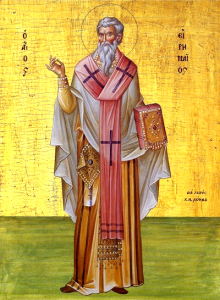 Irenaeus (icon above), a gifted father writing in the second century, also emphasized the importance of apostolic teaching and tradition in the propagation of the Gospel and particularly stressed the important role bishops played in preserving and protecting apostolic truth. “By ‘knowledge of the truth,’” he writes, “we mean the teaching of the Apostles; the order of the Church as established from the earliest times throughout the world.” Irenaeus contends that the “distinctive stamp of the body of Christ” is “preserved through the Episcopal succession: for to the bishops the apostles committed the care of the Church which is in each place, which has come down to our own time.” Heresy can be identified, Irenaeus believes, by the willingness of the heretic to proclaim a message “that he himself has discovered by himself – or rather invented.” When the heretic is presented with the tradition derived “from the Apostles, and which is preserved in the churches by the successions of presbyters, then they oppose tradition, claiming to be wiser not only than the presbyters but even than the Apostles, and to have discovered the truth undefiled.” Irenaeus explains that in distinction from the heretic – a theological maverick of sorts – the genuinely “talented theologian… will not say anything different from these beliefs (for ‘no one is above his teacher’): nor will the feeble diminish the tradition.
Irenaeus (icon above), a gifted father writing in the second century, also emphasized the importance of apostolic teaching and tradition in the propagation of the Gospel and particularly stressed the important role bishops played in preserving and protecting apostolic truth. “By ‘knowledge of the truth,’” he writes, “we mean the teaching of the Apostles; the order of the Church as established from the earliest times throughout the world.” Irenaeus contends that the “distinctive stamp of the body of Christ” is “preserved through the Episcopal succession: for to the bishops the apostles committed the care of the Church which is in each place, which has come down to our own time.” Heresy can be identified, Irenaeus believes, by the willingness of the heretic to proclaim a message “that he himself has discovered by himself – or rather invented.” When the heretic is presented with the tradition derived “from the Apostles, and which is preserved in the churches by the successions of presbyters, then they oppose tradition, claiming to be wiser not only than the presbyters but even than the Apostles, and to have discovered the truth undefiled.” Irenaeus explains that in distinction from the heretic – a theological maverick of sorts – the genuinely “talented theologian… will not say anything different from these beliefs (for ‘no one is above his teacher’): nor will the feeble diminish the tradition.
The word heresy is from a Greek word signifying (1) a choice, (2) the opinion chosen, and (3) the sect holding the opinion. In the Acts of the Apostles it denotes a sect, without reference to its character. Elsewhere, however, in the New Testament it has a different meaning attached to it. Paul ranks “heresies” with crimes and seditions. This word also denotes divisions or schisms in the church . In Titus 3:10 a “heretical person” is one who follows his own self-willed “questions,” and who is to be avoided. Heresies thus came to signify self-chosen doctrines not emanating from God. In the Church, heresy is always distinguished from true doctrine by a consensus of the Bishops of the Church.
